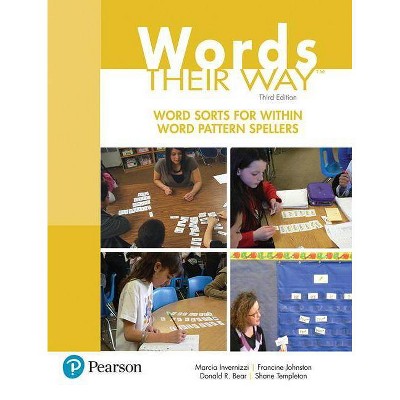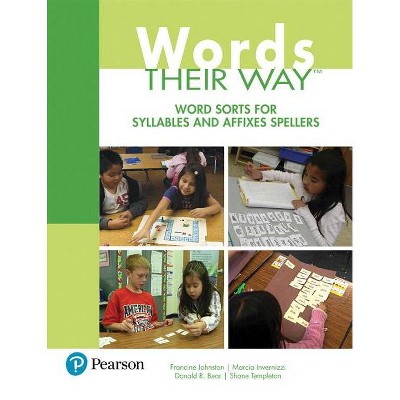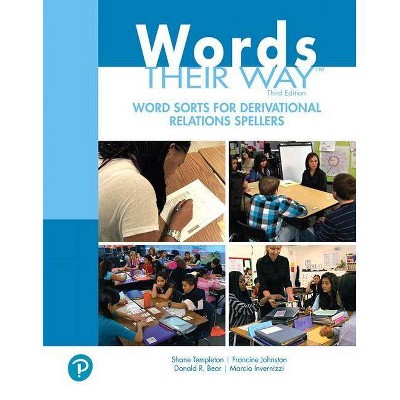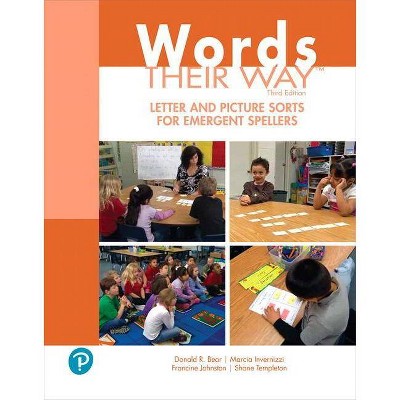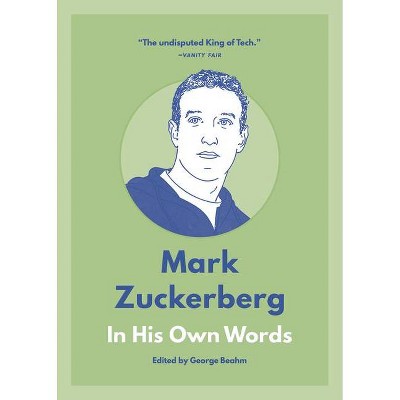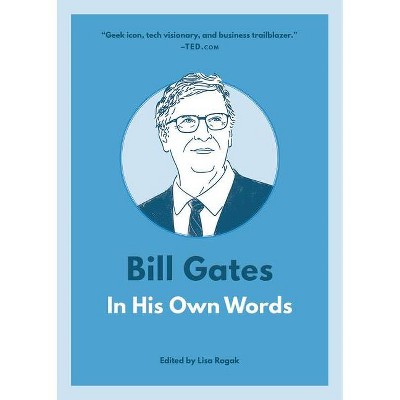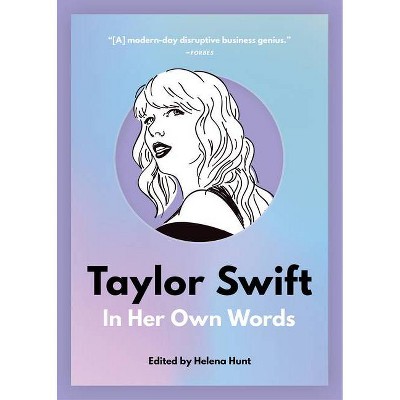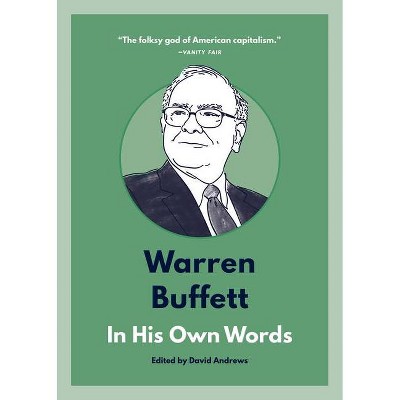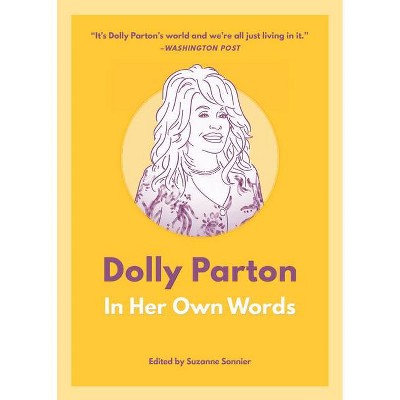Words Their Way - 2nd Edition (Paperback)
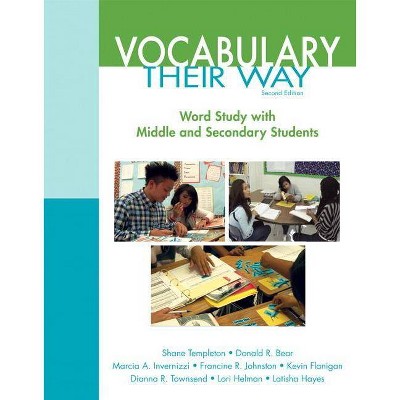
Similar Products
Products of same category from the store
AllProduct info
<p/><br></br><p><b> Book Synopsis </b></p></br></br><b></b> The most comprehensive vocabulary text available, this book gives pre-service, novice, and experienced middle and high school teachers' invaluable tools to share with their student to enable them to learn thousands of words independently.</p> </p> <b>KEY TOPICS: </b> Vocabulary, Teaching, Assessment, Middle School, Secondary/High School, Common Core, English Language Learners, Academic Vocabulary, Academic Language, Greek and Latin Elements, Generative Morphology, Disciplinary Literacy, English Learners/Multilingualism, Differentiated Instruction, Common Core English/Language Arts Standards Teaching </p> </p> <b>MARKET: </b> For pre-service, novice, and experienced teachers of middle and high school students</p><p/><br></br><p><b> From the Back Cover </b></p></br></br>A new edition of the most comprehensive vocabulary text available for pre-service, novice, and experienced teachers of middle and high school students, <i> Vocabulary Their Way, 2/e </i>providesinvaluable tools for teachers to share with their students that will enable them to learn thousands of words independently. With an emphasis on developing students' word consciousness--the knowledge and predisposition to learn, appreciate, and effectively use words--the book addresses three broad aspects of vocabulary learning and instruction: context-based instruction, word-specific instruction, and generative morphology instruction, as a means to enabling teachers to teach vocabulary their way. </p> </p> New to the Second Edition: </p> <ul> <li> <b>NEW! The Common Core Standards addressed each activity and strategy</b> are referenced: English Language Arts, Mathematical Practice, and Next Generation Science Standards. </li> <li> <b>NEW! Updated research in vocabulary and acquisition and instruction</b> gives teachers the latest information in the field. </li> <li> <b>NEW! Academic Language is addressed</b> showing how teachers can "unpack" the language of their discipline and make it accessible to students. </li> <li> <b>REVISED ESL chapter </b>includes a strong new multilingual focus, reflecting the most recent research and instructional lens in the field of multilingualism. </li> <li> <b>And more!</b> </li> </ul> <b> </b></p> <b>Meet the Authors</b></p> </p> <b>Shane Templeton </b>is Foundation Professor Emeritus of Literacy Studies at the University of Nevada, Reno. A former classroom teacher at the primary and secondary levels, his research has focused on developmental word knowledge in elementary, middle, and high school students, focusing primarily on the relationships between spelling, morphology, and vocabulary. </p> </p> <b>Donald Bear </b>is a professor in literacy education at Iowa State University where he teaches doctoral, master's, and pre-service teachers, and directs the Duffelmeyer Reading Clinic. He is also professor emeritus from the University of Nevada, Reno. Donald is involved in studies that examine literacy learning, particularly studies of orthographic development in different and second languages. </p> </p> <b>Marcia Invernizzi </b>holds the Henderson Professorship in Reading Education at the University of Virginia's Curry School of Education where she is also the Executive Director of the McGuffey Reading Center. She advises masters and doctoral students and teaches reading courses in the Department of Curriculum, Instruction, and Special Education. </p> </p> <b>Francine Johnston </b>is a former classroom teacher and reading specialist who learned about word study during her graduate work at the University of Virginia. She is retired from the School of Education at the University of North Carolina at Greensboro, where she taught literacy courses and directed a clinic for struggling readers. She continues to work with regional school systems as a consultant. </p> </p> <b>Kevin Flanigan </b>is a professor in the literacy department at West Chester University of Pennsylvania. He works in the WCU Reading Center, where he and master's students work with children who struggle to read and write. A former middle grades classroom teacher and reading specialist/coach, he researches and writes about developmental word knowledge and struggling readers and works with schools to implement effective literacy instruction. </p> </p> <b>Dianna Townsend </b>is Associate Professor in Literacy Studies at the University of Nevada, Reno. Her research is in the areas of adolescent literacy, academic language, and the academic vocabulary development of English learners. In past and current studies, she has examined what adolescents know about and can do with academic vocabulary. </p> </p> <b>Lori Helman </b>is Associate Professor at the University of Minnesota in the Department of Curriculum and Instruction, and Co-Director of the Minnesota Center for Reading Research. She specializes in literacy education and teacher leadership. Formerly a bilingual classroom teacher for 16 years, Lori was also a coordinator of beginning teacher development and literacy coordinator of her school district. </p> </p> <b>Latisha Hayes </b>has taught students with reading disabilities in the primary through middle grades as a special educator and reading specialist. Now a clinical assistant professor at the University of Virginia, she teaches courses on the diagnosis and remediation of reading difficulties. She works with pre-service and in-service teachers at the McGuffey Reading Center, where students across the grades receive diagnostic and tutoring services. </p> </p><p/><br></br><p><b> Review Quotes </b></p></br></br><br>"This book is a wonderful primer for those just learning to teach and/or understand the necessity of vocabulary development for content area mastery." <b>--</b> <b>Jane M. Saunders</b>, <b>Texas State University</b> </p> </p> "<i>Vocabulary Their Way</i> offers a wealth of resources that teachers can use to build their own knowledge of the origin and structure of the English language as well as the strategies that they can use to support students' vocabulary development. It is accessible, compelling, and interesting and contains a number of classroom examples." <b>--</b> <b>Jennifer Scott Curwood, The University of Sydney (Australia)</b> </p> </p> "This book is very appealing, as teaching academic vocabulary is part of the Common Core standards being adopted by most states. Teachers will welcome the help for their classroom instruction, and administrators will welcome the information for professional development." <b>-- Carla M. Stegall, Gilbert Middle School</b> (<b>Gilbert, SC)</b> </p><br><p/><br></br><p><b> About the Author </b></p></br></br><b>Shane Templeton </b>is Foundation Professor Emeritus of Literacy Studies at the University of Nevada, Reno. A former classroom teacher at the primary and secondary levels, his research has focused on developmental word knowledge in elementary, middle, and high school students, focusing primarily on the relationships between spelling, morphology, and vocabulary. He is widely published in a number of research and practitioner journals, and is co-author of <i>Words Their Way</i>, <i>Words Their Way with Struggling Readers, 4-12, Words Their Way with English Learners</i>, and, with Kristin Gehsmann, <i>Teaching Reading and Writing: The Developmental Approach. </i>Shane's other books include <i>Teaching the Integrated Language Arts</i> and <i>Children's Literacy</i>. With Darrell Morris, he co-authored the chapter on "Spelling" in the <i>Handbook of Reading Research</i>, Volume 3; he is author of the entry on "Spelling Instruction" in the <i>Encyclopedia of Education</i> (2<sup>nd</sup> ed., 2003), and the chapter on Spelling in the <i>Handbook of Research on Teaching the English Language Arts</i> (3rd ed., 2011). Since 1987, Shane has been a member of the Usage Panel of the <i>American Heritage Dictionary</i>. </p> </p> <b>Donald Bear </b>is a professor in literacy education at Iowa State University where he teaches doctoral, master's, and preservice teachers, and directs the Duffelmeyer Reading Clinic. He is also professor emeritus from the University of Nevada, Reno. Donald is involved in studies that examine literacy learning, particularly studies of orthographic development in different and second languages. His research explores the specific sequence students follow across the synchrony of literacy learning from beginning concept of word in prekindergarten to how morphology underlies academic vocabulary learning. He is an author and co-author of numerous articles, book chapters, and 12 books, including <i>Words Their Way, 5<sup>th</sup> edition</i>, <i>Words Their Way with English Learners</i>, and <i>Words Their Way with Struggling Readers, 4 - 12.</i> He is an author on several instructional programs used throughout the United States. Donald is also involved in innovative professional development grants, and his work in assessment and word study is used widely. He has received several awards for teaching and service, and is currently a board member of the International Reading Association.</p> </p> <b>Marcia Invernizzi </b>holds the Henderson Professorship in Reading Education at the University of Virginia's Curry School of Education where she is also the Executive Director of the McGuffey Reading Center. She advises masters and doctoral students and teaches reading courses in the Department of Curriculum, Instruction, and Special Education. Her research on the subject of word study, reading disabilities, assessment, reading development, and intervention, has been published in journals including <i>Reading Research Quarterly, The Journal of Literacy Research, The Reading Teacher, The Elementary School Journal, The Journal of Speech, Hearing, and Language Services, The Journal for the Education of Students Placed At Risk, Scientific Studies of Reading</i>, <i>Applied Psycholinguistics, </i>and<i> Early Childhood Research Quarterly</i>. She is the primary author of <i>Phonological Awareness Literacy Screening </i>(PALS), a literacy assessment used widely across the nation. She is the co-founder of <i>Book Buddies</i>, a tutoring framework for struggling readers, and coauthor of <i>Words Their Way</i>. A former English and reading teacher, Marcia continues to work with teachers and their students at the McGuffey Reading Center.</p> </p> <b>Francine Johnston </b>is a former classroom teacher and reading specialist who learned about word study during her graduate work at the University of Virginia. She is retired from the School of Education at the University of North Carolina at Greensboro, where she taught literacy courses and directed a clinic for struggling readers. She continues to work with regional school systems as a consultant. She is a co-author of the <i>Words Their Way</i> series of books and materials, and has published in a number of practitioner and research journals including the <i>Journal of Educational Psychology</i>, <i> Literacy Research and Instruction</i>, and <i>The Reading Teacher</i>.</p> </p> <b>Kevin Flanigan </b>is a professor in the literacy department at West Chester University of Pennsylvania. He works in the WCU Reading Center, where he and master's students work with children who struggle to read and write. A former middle grades classroom teacher and reading specialist/coach, he researches and writes about developmental word knowledge and struggling readers and works with schools to implement effective literacy instruction. Kevin has authored or co-authored articles in <i>The Reading Teacher</i>, <i>The Journal of Adolescent and Adult Literacy</i>, the <i>Journal of Literacy Research</i>, and is a co-author of <i>Words Their Way With Struggling Readers: Word Study for Reading, Vocabulary, and Spelling Instruction, Grades 4 - 12</i>. He is co-author, with Latisha Hayes, of <i>Developing Word Recognition</i> (2014, Guilford Press).</p> </p> <b>Dianna Townsend </b>is Associate Professor in Literacy Studies at the University of Nevada, Reno. Her research is in the areas of adolescent literacy, academic language, and the academic vocabulary development of English learners. Her work has been published in <i>The Elementary School Journal</i>, <i>Reading Research Quarterly</i>, <i>Reading and Writing: An Interdisciplinary Journal</i>, <i>Topics in Language Disorders</i>, the <i>Journal of Adolescent and Adult Literacy</i>, as well as in a number of edited volumes. In past and current studies, she has examined what adolescents know about and can do with academic vocabulary. She also facilitates inquiry-based professional development with secondary teachers, partnering with both novice and expert teachers, to investigate the best approaches for supporting adolescents in developing academic language proficiency in the disciplines. A former secondary English teacher, Dianna teaches classes in adolescent literacy, content areas literacy assessment, and literacy research methods. Through her teaching and writing, she helps both pre-service and in-service teachers understand the language demands of the disciplines and provide scaffolds so that all students can access instruction. </p> </p> <b>Lori Helman </b>is Associate Professor at the University of Minnesota in the Department of Curriculum and Instruction, and Co-Director of the Minnesota Center for Reading Research. She specializes in literacy education and teacher leadership. Formerly a bilingual classroom teacher for 16 years, Lori was also a coordinator of beginning teacher development and literacy coordinator of her school district. She has expertise in working with students from culturally and linguistically diverse backgrounds, and is bilingual in Spanish. Her research focuses on students' language and literacy development, including students who are learning English as a new language. She has a deep knowledge of the theory and practical application of vocabulary and word study. Lori is lead author of <i>Words Their Way with English Learners: Word Study for Phonics, Vocabulary, and Spelling Instruction </i>and co-author of others in the series that help teachers build on the resources of multilingual students. She has also published texts and articles on various aspects of literacy development and instruction, and their applications to diverse learners and teacher education. </p> </p> <b>Latisha Hayes </b>has taught students with reading disabilities in the primary through middle grades as a special educator and reading specialist. Now a clinical assistant professor at the University of Virginia, she teaches courses on the diagnosis and remediation of reading difficulties. She works with preservice and in-service teachers at the McGuffey Reading Center, where students across the grades receive diagnostic and tutoring services. Latisha's interests have focused on the support of struggling readers through university-based programs and partnerships. Her work has been published in <i>Reading Research Quarterly</i>, <i>Literacy Research and Instruction</i>, <i>Communication Disorders Quarterly</i>, and the <i>Handbook of Reading Disability Research</i>; she is co-author of <i>Words Their Way with Struggling Readers, 4-12</i>, and with Kevin Flanigan, <i>Developing Word Recognition</i> (2014, Guilford Press).</p> </p>
Price History
Cheapest price in the interval: 49.99 on November 6, 2021
Most expensive price in the interval: 54.99 on February 4, 2022
Price Archive shows prices from various stores, lets you see history and find the cheapest. There is no actual sale on the website. For all support, inquiry and suggestion messagescommunication@pricearchive.us
